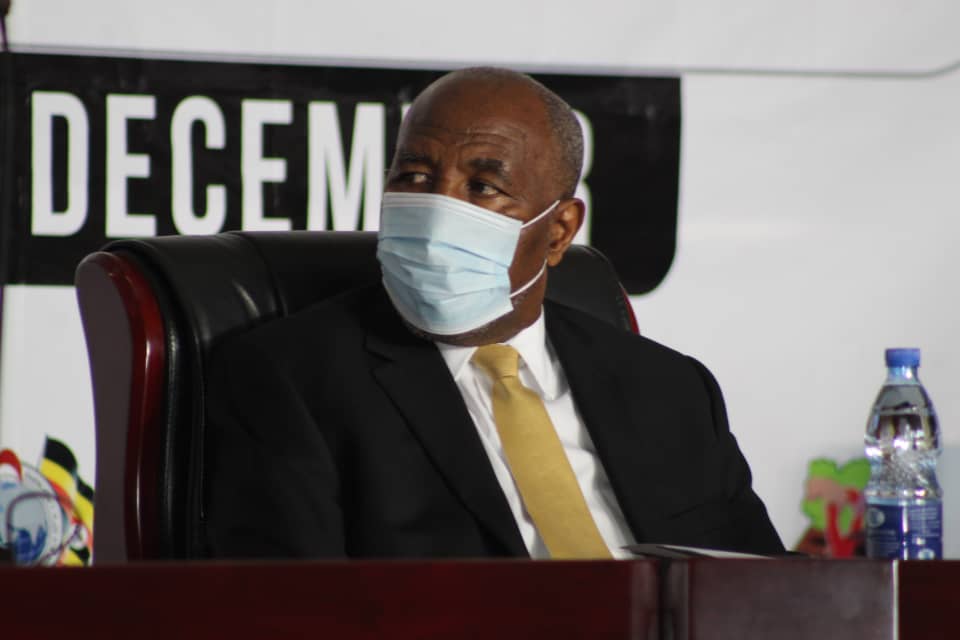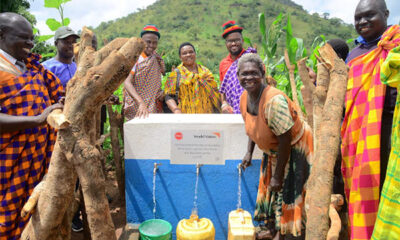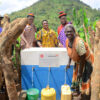Health
Rugunda calls for Concerted Effort in Fight Against HIV Aids

Prime Minister Ruhakana Rugunda
The Prime Minister of Uganda Rt Hon Dr Ruhakana Rugunda has rallied development partners for a concerted effort towards the fight against COVID-19.
Rugunda was speaking at the Annual International Aids Day commemorations held at the office of the Prime Minister in Kampala under the theme “National Solidarity and a shared Responsibility Towards Ending AIDS”, in a ceremony attended by different heads of Missions and other government agencies.
“For a long time Uganda has been receiving funds from donors to help in the fight against HIV Aids, we know donor support has been decreasing with competitive priorities, but we wish this support stays,” Rugunda said.
He said in the fight against HIV Aids there’s need to garner conscious efforts on how to end the spread of the HIV Aids. However he claimed there has been a tremendous progress in the fight against HIV Aids.
In her message, the State Minister for primary Health care, Dr Moriku Kaducu who represented the Minister for Presidency Esther Mbayo, thanked the AIDS Control stakeholders who have worked alongside the Government of Uganda in addressing this big challenge.
“Together, we have made tremendous progress towards HIV epidemic Control and ending AIDS as a public health threat. As we close the year, we take stock of our achievements and the progress we have made towards the attainment of the global UNAIDS targets,” He said.
Kaducu said Because of the work the country has done with development partners, Uganda continues to register declines in new HIV infections and AIDS related death.
She said the 2019 data indicates that new infections were 53,413 down from 100,000 in 2015 while AIDS related deaths were 21,000 compared to 65,000 in 2015. At the end of 2019, 1.4 million People were Living with HIV and AIDS. Adults aged 15 years+ accounted for 93% of this, with 60% of HIV-infected adults being women.
Kaducu said government through the health ministry, continued the Implementation of HIV Programs by prioritizing Primary HIV prevention interventions.
“ In the last year, we promoted the ABC model of Abstinence, Faithfulness and the consistent use of Condoms. We also intensified social behavioral change Communication programs utilizing multiple media channels including print, radio, television, road-side bill boards, posters, leaflets and interpersonal communication,” she said
The Ministry of Health and stakeholders including the US Centers for Disease Control and Prevention and ICAP at the University of Columbia in New York finalized and launched the Uganda Population HIV Impact Assessment Survey 2020 (UPHIA2020). Preparatory activities including the hiring and training of field workers were completed in October 2019, Field teams were deployed in February 2020 and data collection began.
However due to the covid-19 pandemic mitigation measures, Field teams were recalled and the data collection was paused in March. The survey has however now been restarted and data collection will be completed in February 2021.
Data from this Survey will help update the burden of HIV and AIDS in the Country and enable measurement of progress to the attainment of the global HIV targets.
The Chairperson of the parliamentary committee on HIV Aids, Florence Wamala Nambozo said COVID-19 pandemic has posed serious threats across the society and especially to People Living with HIV who got affected in accessing the services during the lockdown. But with the country gradually getting back to its feet there is hope that normalcy will soon be realized.
She urged Ugandans not to let their guards down by engaging in risky sexual behavior that could undo all the gains made towards ending AIDS by 2030.
“Let us keep alert to the fact that AIDS is still a threat to the human race and the excitement of the festive season should not end in regret, I therefore call upon all the stakeholders to maintain the efforts in fighting HIV/AIDS to achieve the goal of ending AIDS by 2030,” She said.
Namboozo said Parliament will continue to provide a conducive and enabling environment making appropriate laws, allocating resources and provide oversight to ensure access to HIV services to all those who need them.
DR Houinato Maximo the head of UN Women in Uganda who spoke on behalf of the HIV AIDS development patners said, Uganda maintained momentum and was named among the 14 countries globally that registered good progress in enrolling and maintaining close to 90% [ 84%] of all people with a confirmed HIV test on anti-retroviral therapy, and almost 80% [75%] of these individuals have been virally suppressed.
“In addition, the ADPG Community commends the Country’s HIV prevention efforts that have contributed to a 43% decline in the total number of new HIV infections from 94,000 in 2010 to 53,000 in 2019. Of concern, however, is that this translates to about 1,000 new infections pa week – a number that is still too high,” he said.
Maxim said there further concern is the rate of new infections which is highest among young people 15-24years; adult women 25 – 34 years and adult men 35-49 years, citing that HIV prevention messaging, technologies and interventions must therefore target these segments of the population.
The United States of America Ambassador to Uganda, Natalie Brown. Said she was amazed with the efforts the country is dedicating towards the eradication of HIV Aids in the country by 2030.
.
Dr Nelson Musoba the Uganda Aids Commission Director General, said the country is in phase 3 of a research where people will no longer have to use PEP tablets but shift to the use of injections that confers protection from spreading the disease for a couple of weeks. The daily practice of swallowing medicines has been linked with increased apathy among patients.
“Some people have been swallowing medicine on a daily basis but now we are in advanced stages of our research where they will take a single injection which will last for some time, if this goes through it’s a good thing, if u use an injection it may take two months to again take another pill,” he said.
Comments


























